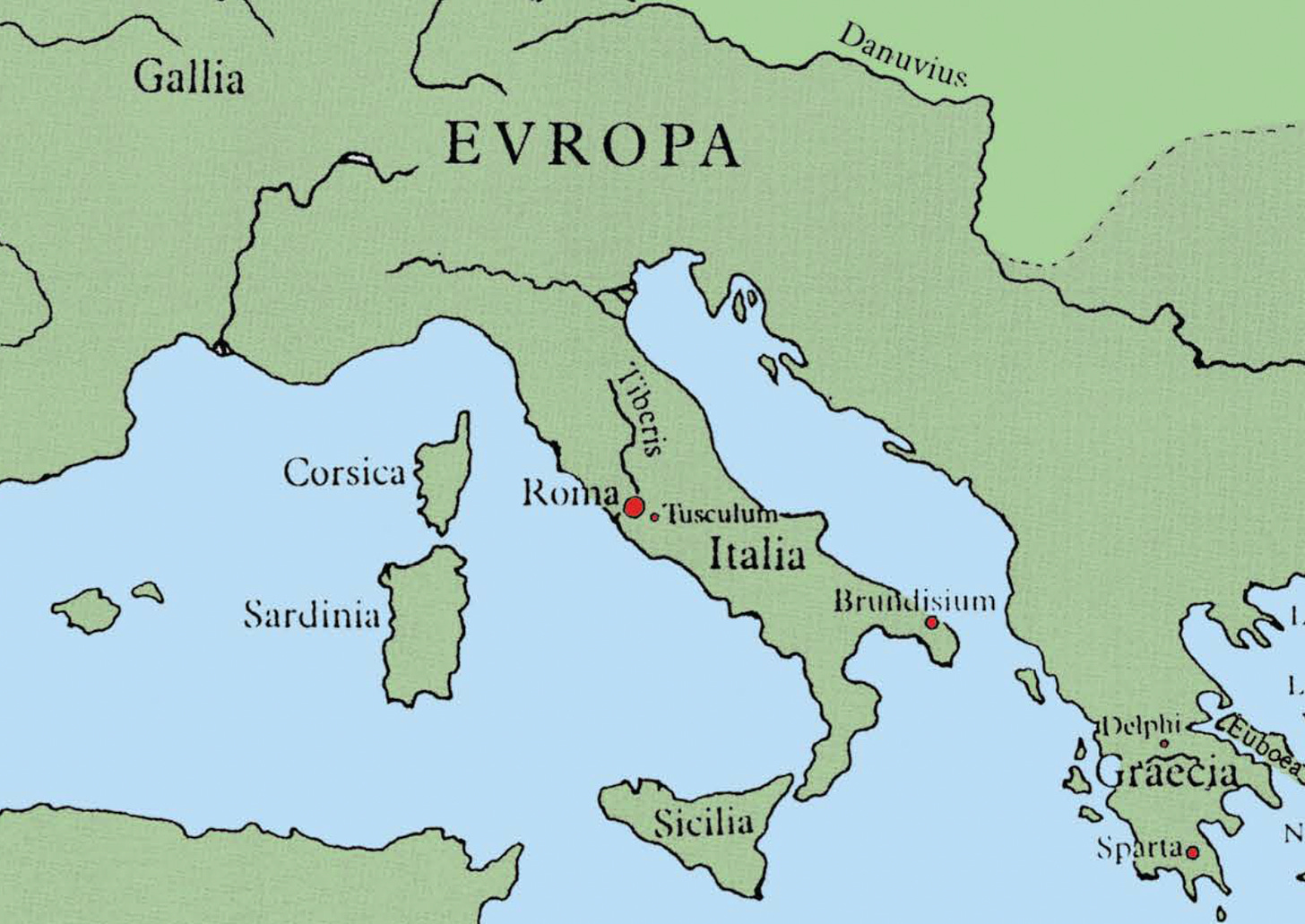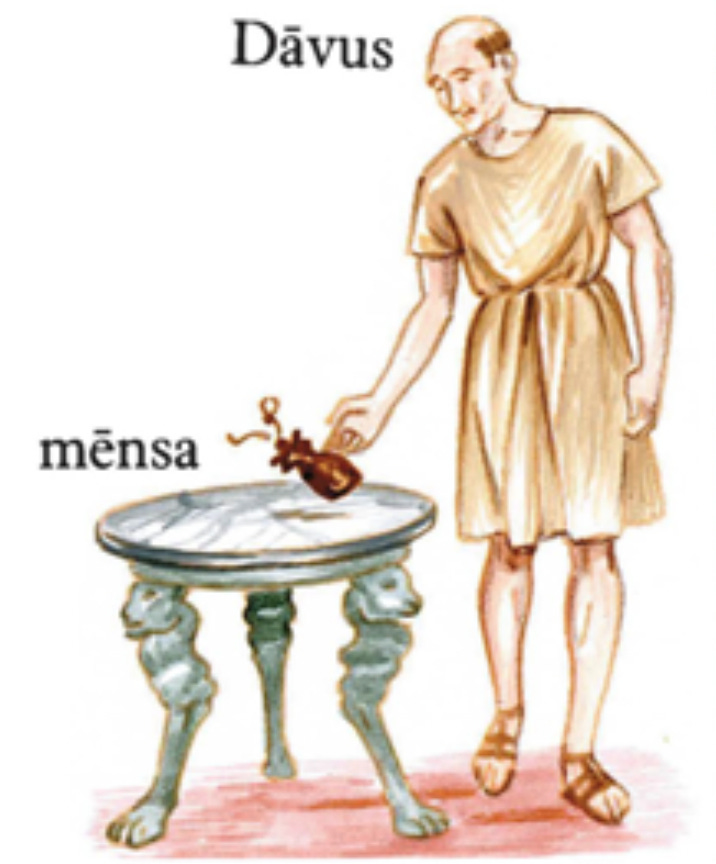In Latin, as in any language, it is very important to know how to answer the question “Where?” in any circumstance.
This article provides a comprehensive exploration of the Latin preposition in when used with the ablative case. You’ll gain a deep understanding of the grammar, illustrated with examples from the textbook Familia Rōmāna and the classical authors.
We’ll cover various uses, specific cases, and key exceptions, offering insights that even seasoned Latin enthusiasts may find enlightening!
Grammar Intuition
To answer the question Ubi? (“Where?”) in Latin we use the following format:
in + ablative
Thus, the Latin preposition in followed by a noun in the ablative case indicates the place where. The essential meaning of in + abl. is to signify “stillness” in some place or inside some container. It is different from in + accusative, which indicates movement toward a place. Perhaps the following image will help you conceptualize it (you may also imagine it as a point in a circle):
Note: Although the Latin form is very similar to English (“Rome is in Italy”), the English preposition “in” does NOT come from Latin, but from Old English.
Some Examples
You find this structure in the very first sentence of Familia Rōmāna (see Lesson 01):
Familia Rōmāna, I. 1:
Rōma in Italiā est.
Here, the phrase answers to the question Ubi est Rōma? (“Where is Rome?”). The last ā in Italiā is long because the word is declined in the ablative case.
Remember that to decline to the ablative case the noun of the place, you must transform the ending as follows, according to the declension:
(1) īnsul-a → īnsul-ā
(2) fluvi-us → fluvi-ō, oppid-um → oppid-ō
Therefore we say that Italia in Eurōpā est (Eurōp-a → Eurōp-ā), but we say that Nīlus est fluvius in Aegyptō (Aegypt-us → Aegypt-ō).
From its more primitive “geometric” meaning, in + abl. is also frequently used to denote being in abstract places, states of mind, time periods, etc. For example:
Ter. Adelph. prol. 20:
In bellō, in ōtiō, in negōtiō.
Nepos Cim. 4:
In bellō, in pāce.
Other Cases
The same formula in + abl. is used with the verbs pōnere (“to put”), collocāre (“to place”), statuere (“to set”), etc., because we consider the “still” state in which the object remains after the action (see Lesson 15). For example:
Familia Rōmāna, IV. 60-61:
Iūlius: “Sacculum tuum in mēnsā pōne!” Dāvus sacculum suum in mēnsā pōnit.
Additionally, we use the same format with the intransitive verbs sedeō (“to sit”), cōnsīdere (“to take a seat”) and the like, to indicate the place where we sit:
Cic. Brut. 6. 24:
In prātulō propter Platōnis statuam cōnsēdimus.
Finally, in + abl. can also be used to indicate an action or movement that takes place within a well-delimited or circumscribed place. We find an example of this in Familia Rōmāna, when Mēdus and Lȳdia visit Albīnus‘s tavern:
Familia Rōmāna, VIII. 11-12:
Multae fēminae, quae in hāc viā ambulant, ante tabernam Albīnī cōnsistunt.
In the above cases, it is somewhat surprising to find in + abl., because due to the “dynamic” nature of the verbs, we would have expected the accusative case.
Exceptions
An important exception to what we have seen are the names of cities or small islands (large islands are exempt from the exception!). In these cases, we use the following rules:
• the genitive case with the singular nouns of 1st (e.g., Rōma) and 2nd declension (e.g., Tūsculum)
• the simple ablative with nouns of other declensions (e.g., Karthāgō, Neōpolis)
• the simple ablative with plurals nouns of the 1st (e.g., Athēnae) and 2nd declensions (e.g., Delphī)
Thus, we say that In Siciliā est mōns Aetna, because Sicily is a large island, but that Delphīs est templum Apollinis, because Delphi (lat. Delphī, -ōrum) is a city in Greece.
In Familia Rōmāna we find an application of this rule when the servant Mēdus escapes from the villa of his master:
Familia Rōmāna, VI. 47:
Mēdus Tūsculī nōn est; neque Rōmae est Mēdus.
The Locative Case
In these exceptions, we are actually using the so-called locative case. This case, of remote Indo-European origin, disappeared in Latin, eventually merging, as we have seen, with the genitive or ablative endings.
The locative case survived, besides the names of cities and small islands, also in a very small group of very commonly used nouns: domus (“house”), rūs (“countryside”) and, more rarely, animus (“mind”). See, for example:
Familia Rōmāna, XV. 80-81:
Diodōrus: “Sed ubi est frāter tuus, Marce?” Mārcus: “Is domī est apud mātrem suam.”
Familia Rōmāna, XXVII. 65-67:
In urbe Iūlius semper in negōtiō est, sed rūrī in ōtiō cōgitat dē negōtiīs urbānīs.
It also survived in some very common (and highly idiomatic) expressions that include some nouns that in other contexts would use the normal in + ablative:
• terrā marīque (“by land and by sea”)
• domī bellīque (“in peace and in war”)
• domī mīlitiaeque (“in peace and in war”)
Related posts:
• Latin For Beginners: Lesson 1
• Latin For Beginners: Lesson 15




















